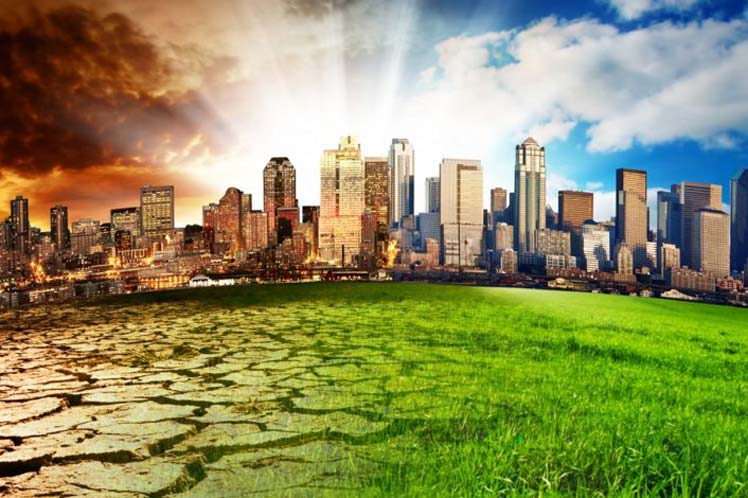By Oscar Bravo Fong
Journalist at the International Newsroom in Prensa Latina
Assessing this situation at Africa Climate Week, which was held in Gabon from August 29 to September 2, the head of that state, Ali Bongo, stated that the ongoing drought is causing severe famine and displacing millions of people in the region.
Analysts have not gone unnoticed by the recent exorbitant floods, caused by flash rains in countries such as South Sudan and Senegal, with loss of life and material damage.
With nearly a thousand delegates present, including heads of state, government representatives and environmental groups, the President agreed with other speakers on the need for urgent action to mitigate the effects of climate change.
After considering that for this reason about 22 million people in the so-called Horn of Africa, along with countries such as Somalia and Ethiopia, suffer from famine, he warned that rising sea levels threaten, among other things, the cities of Dakar, Senegal. ; Lagos, Nigeria; Cape Town, South Africa; And Libreville, Gabon.
In its closing statement, the Forum highlighted the importance of “struggling together to bring down the average global temperature to 1.5°C and build a resilient future,” which will lay the foundations for the regional momentum for climate action.
In preparation for the United Nations Climate Conference COP27, which will be held in Egypt next November, the Gabonese meeting discussed issues such as adaptation to climate change, mitigation measures, and climate finance.
On this last topic, according to World Bank data, to comply with obligations to protect the environment, the region as a whole will need until 2030 a financial fund of about 1.6 billion dollars.
In the face of the global emergency of climate change, a large part of these resources must be provided by industrialized nations, which are the world’s largest atmospheric pollutants through the release of excessive amounts of carbon dioxide.
Several speakers also agreed that at the upcoming Environmental Conference “we must show how the Paris Climate Agreement will be achieved, through the application of policies and programmes, through innovation and transformation.”
For the Egyptian Foreign Minister, Sameh Shoukry, one of those responsible for regulating Cop27, it is important to warn of the failure of developed countries to comply with their commitments to climate change.
In the face of this unhealthy situation, African countries, which have few financial resources at their disposal, are spending 2-3% of their GDP every year to reduce the impact of climate change, the official said.
Gabon example
In the midst of the Gabon event, social activists, on the other hand, revealed that the local government, despite the fact that foreign multinationals are exploiting its large timber reserves, has become an example in protecting the tropical forests of the Congo Basin.
According to Libreville Minister of Forests, Oceans, Environment and Climate Change, Lee White, the Central African country with its environmental conservation policies is a model in preserving tropical forests, which cover 88 percent of the country.
Al-Jazeera satellite channel reported that whites and environmentalists in general, it is important to protect the life of species and plants in the aforementioned Congo Basin, which is the largest in Africa with an area of about three million and 700 thousand square kilometers.
This water mirror stretches across lands such as Cameroon, Central African Republic, Republic of the Congo, Democratic Republic of the Congo, Equatorial Guinea, and Gabon.
He also noted that if the trees are cut down in Gabon, sufficient rainfall will stop in northern Nigeria and the Sahel region, and if the forest is destroyed in the Democratic Republic of the Congo, it will not rain in Ethiopia and blue. The Nile, “And if it is lost, then Egyptian agriculture is lost.”
This analysis illustrates the interrelationship that exists in environmental matters between the different ecosystems of African countries and beyond these demarcations.
In addition to Gabon’s experience in preserving its forested areas, other initiatives are being launched on the continent, such as the initiative of Nigeria, the main oil producer on the African continent, which is developing an energy transition plan.
This project, for the development of which the Abuja government seeks to mobilize about $410 billion, aims to reach the year 2060 with zero emissions of harmful gases into the atmosphere, according to the Premium Times digital portal.
Even in the midst of a warming climate and conditions of poverty in many regions, the African continent struggles to direct its development, with the physical and spiritual growth of local communities and the preservation of rivers, forests, flora and fauna.
It is not in vain that Africa, among other advantages, as well as a large growing market, has enormous natural wealth and its youngest and most numerous population on the planet, which needs to survive by preserving its habitat.
arb / to / obf

“Unapologetic tv specialist. Hardcore zombie trailblazer. Infuriatingly humble problem solver.”


:quality(85)/cloudfront-us-east-1.images.arcpublishing.com/infobae/5HTDSHIH5BDTZLUGYVDHX6BU3Y.jpg)
:quality(85)/cloudfront-us-east-1.images.arcpublishing.com/infobae/VDBB64DKPNCZ3FYGPCB2P6UKOY.png)
:quality(85)/cloudfront-us-east-1.images.arcpublishing.com/infobae/3DRCMMPANVGFRDILCJVDFLVJOA.png)


More Stories
Pyongyang condemns US shipments of long-range missiles to Ukraine as a “despicable” policy.
News, protests on campuses and more
Russian air defense intercepts five Ukrainian drones over the Bryansk region